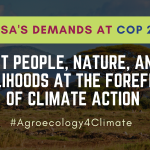A COP28 policy brief for enhancing climate adaptation and resilience through agroecology
This policy brief details the Alliance for Food Sovereignty in Africa’s (AFSA) vision and priorities for agriculture, adaptation, loss and damage and Finance. AFSA’s Climate Change intervention focuses on integrating agroecology into climate policies and negotiations. Our position is backed by policy research conducted in more than 10 African countries and at the regional level, national consultations of key stakeholders across the continent, over 100 case studies on agroecology documented across the African continent, scientific studies from international climate science bodies and engagements with African governments and climate negotiators.
With Africa’s agriculture predominantly dependent on rain-fed farming, hundreds of millions do not have the same safety net afforded those in wealthier, industrialised nations. More than any other region, climate change has reduced agricultural productivity growth by 34% since 1961 and future warming is predicted to negatively affect food systems in Africa by shortening growing seasons and increasing water stress with global warming above 2°C resulting in yield reductions for staple crops across most of Africa. As a matter of concern, the IPCC findings show that extreme weather events will increase food insecurity risks, food price rises, reduced food diversity, and reduced income for agricultural and fishers’ livelihoods, preventing Africa from achieving Sustainable Development Goal 2 by 2030.
AFSA’s climate goal is to strengthen Africa’s resilience to climate change by integrating agroecology into climate change decisions and policies. In this, we prioritise adaptation actions that put small-scale food producers and indigenous communities at the centre of climate solutions, blending local and indigenous knowledge with cutting-edge science without threatening biodiversity and food security.
The IPCC Summary report for policymakers with high confidence recognises the importance of Agroecological principles and practices, ecosystem-based management in fisheries and aquaculture, and other approaches that work with natural processes, support food security, nutrition, health and well-being, livelihoods and biodiversity, sustainability, and ecosystem services.
Hence this policy brief detail AFSA’s position on critical topics that would be discussed at COP 28. COP28 creates opportunities for decision-making and a concrete way forward on the implementation of actions in agriculture and food security, adaptation, finance, loss and damage, among others. It should allow parties to conclude an honest stock-taking exercise and agree on concrete goals and targets to secure a sustainable and liveable future for all, putting the most vulnerable at the forefront of climate action.
We therefore call for transitioning from high-emitting industrial agriculture, corporate monopolies of food systems, and false climate solutions – towards agroecology and self-sufficiency.

































